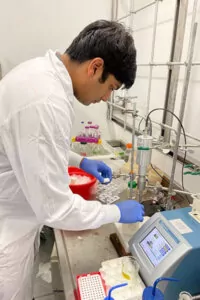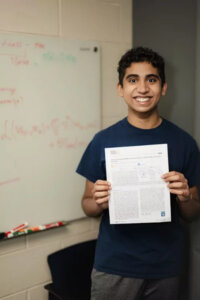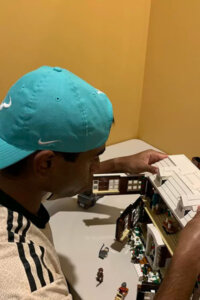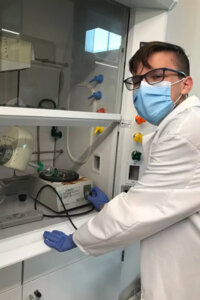The Fellows Scholarship awards $50,000, $25,000 and $10,000 scholarships to extraordinary young people, 18 and under, who have completed a significant piece of work. Application categories are Science, Technology, Engineering, Mathematics, Literature, Music, Philosophy and Outside the Box.
The class of 2022 Fellows included many who developed research that have the potential to better the health of others. A few of these projects are highlighted below.
 Indeever Madireddy received a $10,000 scholarship for a project that has a strong potential to impact people’s lives, helping the body be more equipped to handle viral infections.
Indeever Madireddy received a $10,000 scholarship for a project that has a strong potential to impact people’s lives, helping the body be more equipped to handle viral infections.
Indeever also recently started a new research project on his pet angelfish, publishing a research paper on this project.
He was the first person in the world to sequence the genome of the freshwater angelfish, and was featured in news articles in NewScientist and Interesting Engineering.
Read more about Indeever’s Fellows project >
 Neel Moudgal received a $25,000 scholarship for developing a new platform to predict the structure of various RNA molecules rapidly with easily available data, potentially allowing researchers to develop novel treatments for emerging pathogens, such as SARS-CoV-2 and other viruses.
Neel Moudgal received a $25,000 scholarship for developing a new platform to predict the structure of various RNA molecules rapidly with easily available data, potentially allowing researchers to develop novel treatments for emerging pathogens, such as SARS-CoV-2 and other viruses.
Neel’s method, using only readily available, unassigned chemical shift data to predict the structural properties of an RNA molecule, has the potential to significantly reduce the costs associated with drug development to make medical treatments more affordable.
Read more about Neel’s Fellows project >
 Ashwin Prabhakar received a $10,000 scholarship for developing a rapid and cost-effective method to produce personalized implants using a 3-D imaging system, model generator and scaffold printing system. The implants can monitor the wound environment for infection and deliver needed medication.
Ashwin Prabhakar received a $10,000 scholarship for developing a rapid and cost-effective method to produce personalized implants using a 3-D imaging system, model generator and scaffold printing system. The implants can monitor the wound environment for infection and deliver needed medication.
Ashwin’s process to produce scaffolds for deep-cavity wounds could significantly reduce healthcare costs and patient treatment time.
Read more about Ashwin’s Fellows project >
 Christopher Prainito received a $25,000 scholarship for developing a paper-based biosensor for salivary SARS-CoV-2 detection, which can potentially help to limit the spread of COVID-19. This inexpensive and user-friendly sensor can be used in home environments or in developing regions to rapidly test a large number of patients, therefore, informing quarantine decisions.
Christopher Prainito received a $25,000 scholarship for developing a paper-based biosensor for salivary SARS-CoV-2 detection, which can potentially help to limit the spread of COVID-19. This inexpensive and user-friendly sensor can be used in home environments or in developing regions to rapidly test a large number of patients, therefore, informing quarantine decisions.
This novel diagnostic device could help alleviate the pandemic’s impact on society and potentially save lives.
Read more about Christopher’s Fellows project >
See also:
Comments